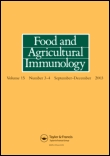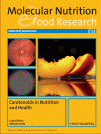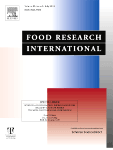
FOOD AND AGRICULTURAL IMMUNOLOGY
Scope & Guideline
Pioneering Research for Resilient Food Systems
Introduction
Aims and Scopes
- Food Immunology and Health:
Research on how various food components and dietary practices influence immune responses, including the modulation of allergies and inflammatory diseases. - Functional Foods and Nutraceuticals:
Exploration of bioactive compounds in foods, their health benefits, and their mechanisms of action in promoting well-being and preventing diseases. - Food Safety and Quality Control:
Studies addressing the detection of pathogens, toxins, and allergens in food products, employing advanced immunological techniques such as ELISA and monoclonal antibodies. - Agricultural Biotechnology:
Research on genetic and biotechnological approaches to enhance food quality, safety, and nutritional value, particularly in the context of climate change. - Microbial Interactions and Gut Health:
Investigation of the gut microbiome's role in health and disease, including the effects of dietary fibers and probiotics on immune function. - Phytochemical Research:
Studies on the immunomodulatory and therapeutic properties of plant-derived compounds, focusing on their applications in food and agriculture.
Trending and Emerging
- Microbiome and Immunity:
There is a growing emphasis on the role of the gut microbiome in modulating immune responses, with studies exploring dietary interventions that impact microbial diversity and health. - Functional Foods and Dietary Interventions for Chronic Diseases:
Research is increasingly focusing on how specific dietary components can prevent or manage chronic diseases like diabetes and obesity, showcasing the importance of nutrition in health. - Natural Bioactive Compounds:
The exploration of plant-derived bioactive compounds for their immunomodulatory and therapeutic effects is gaining momentum, reflecting an interest in natural products as alternatives to synthetic drugs. - Food Allergy and Immunological Responses:
There is a notable rise in research addressing food allergies, particularly the molecular mechanisms behind allergic reactions and the development of diagnostic tools. - Innovative Detection Methods in Food Safety:
Advancements in immunoassay technologies and biosensors for detecting contaminants and allergens in food are emerging as critical areas of research, enhancing food safety protocols.
Declining or Waning
- Traditional Food Preservation Techniques:
Research on conventional methods for food preservation has seen a decline as modern techniques and biotechnological advancements gain more attention, overshadowing traditional practices. - Animal-Based Immunology Studies:
There appears to be a reduction in studies specifically focused on animal models for immunological research, likely due to a growing emphasis on human health and plant-based approaches. - Single-Food Allergen Studies:
The focus on individual food allergens is decreasing, with more comprehensive studies on multiple allergens or broader dietary patterns emerging as a preferred approach. - Chemical Additives and Food Safety:
Research on the safety of chemical additives in food has diminished, possibly due to increasing scrutiny and regulation, leading researchers to focus on natural alternatives. - Conventional Agricultural Practices:
Investigations into traditional agricultural methods are less frequent as researchers pivot towards sustainable and innovative agricultural practices in response to global challenges.
Similar Journals

FOOD SCIENCE AND BIOTECHNOLOGY
Unleashing the Power of Biotechnology in Food ScienceFOOD SCIENCE AND BIOTECHNOLOGY, published by the Korean Society of Food Science & Technology (KOSFOST), stands as a prominent peer-reviewed journal dedicated to advancing knowledge in the fields of food science, biotechnology, and applied microbiology. With ISSN 1226-7708 and E-ISSN 2092-6456, this journal serves as a pivotal platform for disseminating high-impact research from South Korea and beyond, reflecting a robust Q2 ranking in multiple categories including Applied Microbiology and Biotechnology, Biotechnology, and Food Science as of 2023. The journal's influence is further emphasized by its positions in various Scopus ranks, where it showcases a commendable percentile ranking in Agricultural and Biological Sciences and Biochemistry. Although access options remain limited, the journal’s objectives revolve around the publication of innovative research, fostering interdisciplinary collaboration, and facilitating the exchange of ideas among a diverse community of researchers, professionals, and students. Whether you are involved in food technology, microbial biotechnology, or nutritional sciences, FOOD SCIENCE AND BIOTECHNOLOGY are instrumental in shaping the future of these critical fields, propelling advancements that enrich our understanding of food systems and health.

Current Research in Food Science
Pioneering Discoveries in Food TechnologyCurrent Research in Food Science is a leading peer-reviewed academic journal published by Elsevier, specializing in the dynamic field of food science. Since its transition to an Open Access model in 2019, the journal has broadened its reach, contributing significantly to the dissemination of high-quality research. With strong rankings, including a Q1 quartile status in Applied Microbiology and Biotechnology, Biotechnology, and Food Science, it stands out as a pivotal resource for scholars. Based in the Netherlands, current research published within its pages spans a wide range of relevant topics, ensuring that researchers and practitioners stay abreast of the latest advancements. The journal's impressive Scopus rankings enhance its credibility, with a percentile standing in the 74th to 83rd range across relevant categories, underscoring its impact and importance in the academic community. Current Research in Food Science aims to foster the exchange of innovative ideas and foster collaborative efforts among researchers, making it an essential resource for those engaged in advancing the science and technology of food.

eFood
Advancing food science through innovative research.eFood is a pioneering journal in the field of food science, published by the esteemed WILEY. With its impactful emergence, the journal has rapidly established itself within the academic community, evidenced by its impressive Q1 category ranking in Food Science as of 2023, and a commendable position at Rank #95 out of 389 in the Scopus database. Covering a wide spectrum of topics related to food innovation, technology, safety, and nutrition, eFood serves as an indispensable platform for researchers, industry professionals, and students who are at the forefront of advancing our understanding of food systems. The journal notably operates with an open-access model, promoting wide dissemination of knowledge while enhancing the visibility of high-quality research. As we look forward to converging years from 2020 to 2024, eFood is poised to foster rigorous scientific discourse and contribute significantly to the future of food science research.

Food Science and Human Wellness
Pioneering Insights for Wellness through Food ScienceFood Science and Human Wellness, published by TSINGHUA UNIVERSITY PRESS, is an esteemed open-access journal that has been at the forefront of advancing research in the interdisciplinary fields of food science and human health since its inception in 2012. With an impressive impact factor indicative of its quality and relevance, this journal holds a prestigious Q1 ranking in Food Science according to 2023 metrics, reflecting its commitment to high-caliber research and innovation. The journal is positioned within the top 12% of its category, ranked 46th out of 389 in Agricultural and Biological Sciences. The journal not only publishes original research articles but also critical reviews, perspectives, and innovations that contribute significantly to our understanding of the relationship between nutrition, wellness, and food science. With its Open Access model, Food Science and Human Wellness ensures that its valuable content is available to a global audience, fostering collaborative advancements in this vital field. Researchers, professionals, and students are invited to explore insightful discussions and impactful studies that aim to enhance public health and food safety.

Journal of Future Foods
Empowering interdisciplinary dialogue in food science.Welcome to the Journal of Future Foods, a prominent peer-reviewed publication dedicated to advancing knowledge and innovation within the realms of Agricultural and Biological Sciences, Food Science, and Nutrition and Dietetics. Published by KEAI PUBLISHING LTD in China, this journal has rapidly achieved a distinguished reputation, reflected in its impressive Q1 category ranking for both Agricultural and Biological Sciences and Food Science, along with a strong standing in Nutrition and Dietetics. The journal, which spans the period from 2021 to 2025, is committed to fostering interdisciplinary research that addresses the challenges and opportunities presented by the future of food. With a focus on open access, the Journal of Future Foods aims to disseminate crucial findings and foster collaborative dialogue among researchers, professionals, and students alike. By submitting your work, you not only contribute to cutting-edge advancements in the field but also join a vibrant community engaged in redefining the future of food systems.

MOLECULAR NUTRITION & FOOD RESEARCH
Transforming Nutritional Insights into Practical Solutions.MOLECULAR NUTRITION & FOOD RESEARCH, published by Wiley, is a premier journal dedicated to the rapidly evolving field of food science and nutrition. With an impressive impact factor and a consistent position in the Q1 category for both Biotechnology and Food Science in 2023, this journal stands out as a leading platform for researchers, professionals, and students alike. The scope encompasses a comprehensive range of topics from molecular nutrition to innovative food research, with a focus on translating scientific insights into practical applications that enhance human health. As part of its commitment to accessibility, the journal offers open access options, allowing for wider dissemination and engagement with the academic community. Given its high ranking in Scopus—placing 42nd in Food Science and 62nd in Biotechnology—the journal plays a critical role in advancing knowledge and fostering collaboration in these essential fields. For over two decades, it has provided a vital forum for cutting-edge research, ensuring that each issue contributes significantly to the discourse around food and nutrition.

Functional Foods in Health and Disease
Connecting Science and Nutrition for Better Health OutcomesFunctional Foods in Health and Disease is a respected peer-reviewed journal published by FUNCTIONAL FOOD CENTER INC, dedicated to advancing research in the fields of biochemistry, food science, medicine, and nutrition. Since its inception in 2011, this journal has provided a platform for innovative studies that connect the impact of functional foods on health and disease outcomes. With a focus on interdisciplinary research, it aims to disseminate knowledge that enhances the understanding of how specific food components can influence health and well-being. The journal is indexed with an ISSN of 2160-3855 and annually ranked in several categories, including Q4 in Biochemistry and Q3 in Food Science, Medicine, and Nutrition and Dietetics for 2023. As an open access publication, it ensures that research is widely accessible, which is crucial for fostering collaboration and discussion within the scientific community. This journal is a vital resource for researchers, practitioners, and students seeking to explore the dynamic role of functional foods in health promotion and disease prevention.

Food Production Processing and Nutrition
Empowering scholars with breakthrough findings in food science.Food Production Processing and Nutrition, published by SpringerNature, stands at the forefront of advancing knowledge in the vibrant fields of food science, nutrition, and public health. This esteemed Open Access journal, operational since 2019, plays a pivotal role in disseminating breakthrough research that intersects food production processes with nutritional insights, making it an invaluable resource for researchers, professionals, and students alike. With a commendable 2023 impact factor reflecting its robust scholarly contributions — Q1 in Food Science and Q2 in both Nutrition and Dietetics and Public Health, Environmental and Occupational Health — the journal not only emphasizes the importance of innovative food processing methods but also addresses pressing nutritional challenges faced globally. Located in the United Kingdom, it claims an impressive Scopus ranking, with a notable percentile standing across various categorical metrics. As such, Food Production Processing and Nutrition is essential for anyone aiming to deepen their understanding of how food systems impact public health through effective processing and nutritional strategies.

Food Frontiers
Pioneering Research in Food Safety and SustainabilityFood Frontiers, an esteemed publication in the Food Science domain, is proudly published by WILEY. Launched as an Open Access journal in 2020, it aims to facilitate the dissemination of high-quality research that influences contemporary food science and technology. The journal, with an E-ISSN of 2643-8429, has rapidly ascended to a Category Quartile ranking of Q1 in the Food Science category as of 2023, and boasts an impressive Scopus rank of #31 out of 389 in Agricultural and Biological Sciences, placing it in the 92nd percentile. The journal's mission is to explore innovative approaches to food production, safety, and sustainability, making it an essential resource for researchers, industry professionals, and students eager to stay at the forefront of food science advancements. With a commitment to open accessibility, Food Frontiers fosters collaboration and knowledge sharing across the globe, addressing the critical challenges and trends in feeding the world sustainably.

FOOD RESEARCH INTERNATIONAL
Advancing Knowledge in Food ScienceFOOD RESEARCH INTERNATIONAL is a premier academic journal published by ELSEVIER, specializing in the field of Food Science. With an impressive impact factor and ranked Q1 in the 2023 category quartiles, it stands at the forefront of research, positioned 17th out of 389 in the Scopus ranking for Agricultural and Biological Sciences, attaining a commendable 95th percentile. The journal publishes high-quality, peer-reviewed articles that cover a broad spectrum of topics, including food safety, quality control, nutrition, and biotechnology, making it an invaluable resource for academics, industry professionals, and students alike. As FOOD RESEARCH INTERNATIONAL seeks to enhance understanding and advance technologies related to food, it encourages innovative perspectives and interdisciplinary research. The journal, active from 1992 and continuing through 2024, is an essential platform for disseminating vital findings and fostering collaboration within the global food science community.